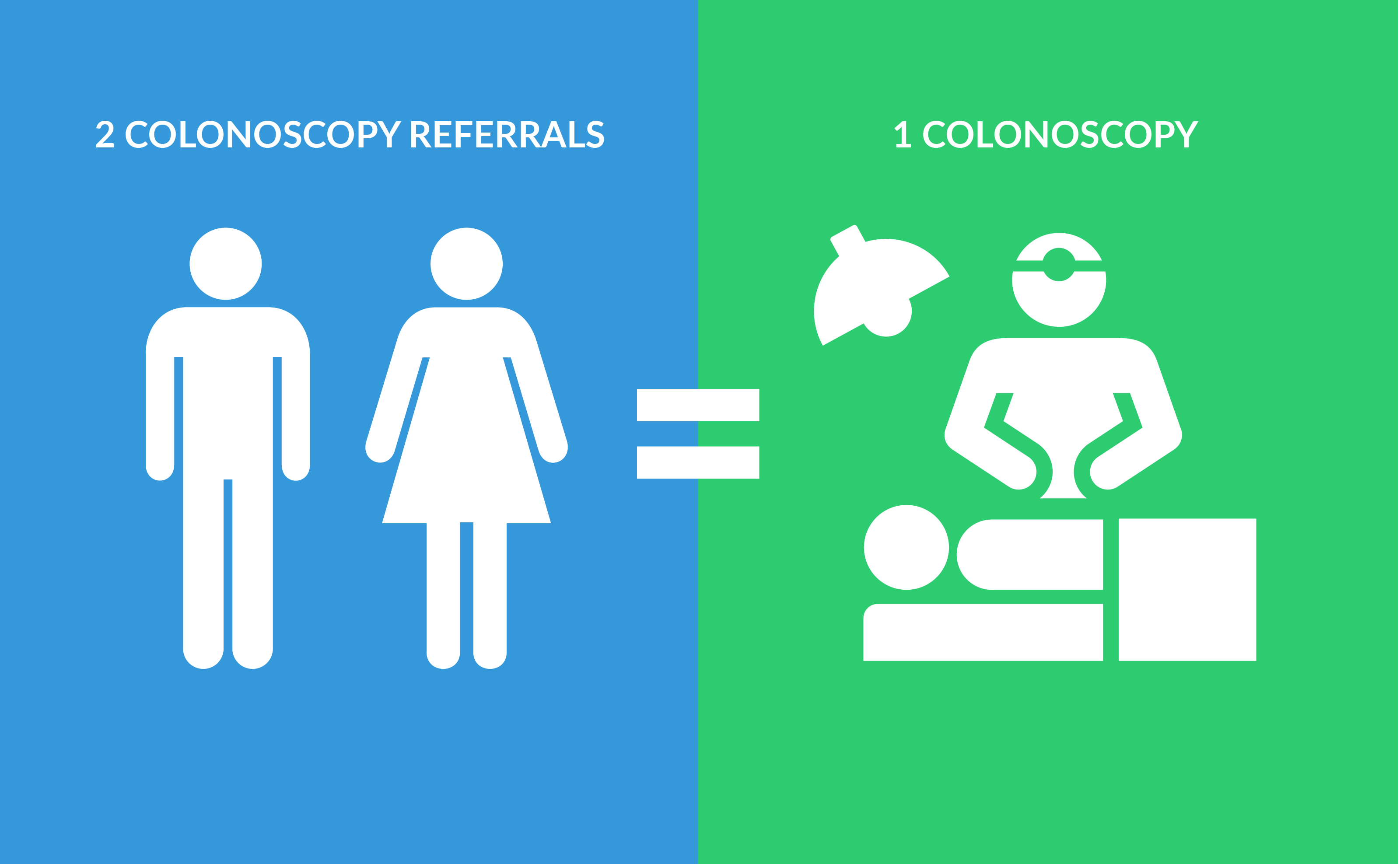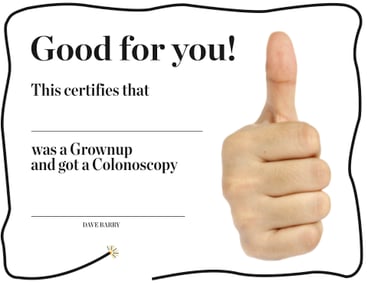
8 out of 100 missed or delayed cancer diagnoses are a result of a failure of a requested referral to occur.1 Furthermore, a recent study found that the risk for colorectal cancer almost doubles when a patient with a positive stool test waits over a year to have a colonoscopy.2 Colorectal cancer is the second leading cause of cancer-related deaths in the United States3 and up to 90% of colorectal cancer deaths are preventable with early detection.4
A significant amount of gastroenterologist referrals are for colonoscopies.5 But for every two patients who are referred by their physician to get colonoscopies, only one of them will end up getting the colonoscopy.6
Why don’t people get their recommended colonoscopies?
According to a study in the Journal of General Internal Medicine, a common reason patients don’t schedule their appointment is that they are too busy. Almost half of the males in the study reported this reason, which is often connected to underlying fears and embarrassments related to the procedure.6
Additional reasons for non-scheduling include a heavier focus on other health concerns, transportation issues, and health system barriers such as patients not knowing it is their responsibility to call to schedule an appointment.
“About 40% of noncompleters, regardless of any fears or concerns they might have had about colonoscopy itself, encountered system barriers to arranging the procedure.”6
So how can more people get proper screening? Through better communication between providers and patients, better assistance in resolving logistical barriers, and improvements to referral and scheduling mechanisms.
In a well-known column titled “A journey into my colon -- and yours," comedian Dave Barry talks about how people don’t get their recommended colonoscopies because they think the procedure is invasive. He also provided colorful commentary on the less than pleasant preparation in this video:
Benefits of colorectal cancer screening

Humor and creative advertisements are an effective way to raise awareness of the need for colonoscopies, but the issue is a serious one. Screening has been shown to decrease colorectal cancer incidence by up to 54% and mortality by up to 60%.7 On top its life-saving qualities, recommended screening for colorectal cancer is one of the CMS Core Quality Measures agreed upon by a consortium of government regulators, private insurers, and leading health organizations earlier in 2016. With an average 50% patient non-adherence rate for colonoscopies, many physicians are going to score low on their colorectal cancer screening metrics for their practice, potentially impacting reimbursement.
[INFOGRAPHIC] 10 Essentials of Closed-Loop Referrals:
Benefits of high-performance referral management for colonoscopy referral adherence
High-performance referral management can increase patient colonoscopy adherence by
- Improving communication7
- Improving and standardizing the colonoscopy referral process7
- Encouraging patient adherence at every step of the referral process
When referral orders are more visible to specialists through electronic referral management, gastroenterologists are able to know 100% of the time when a patient is referred for a colorectal cancer screening. That way, gastroenterologists can contact patients directly instead of waiting for the patients to contact (or, half the time, not contact) them.
Electronic referral management provides referral performance metrics, so PCP practices can identify patients that are not making appointments to get recommended colonoscopies. Metrics allow PCP practices to make further changes to their referral workflows to increase adherence when a patient declines an appointment, such as following up with patients when specialists can’t get in touch to schedule the referred appointment.
When PCPs follow up with patients who did not schedule recommended colonoscopy appointments, referral management allows PCPs to be proactive more quickly. They can provide motivational interviewing and use other techniques to do more for their patients without having to wait until the next visit.

The many benefits of electronic referral management are a result of tracking and closing referral loops, which cannot be done easily with just an EHR system. High-performance referral management allows PCP practices to see referral time-to-treatment and time-to-acceptance specialist performance data so they can choose the best performing gastroenterologists to partner with on patient referrals.
For many practices, referral performance metrics are revolutionary. After implementation the practice can see, for the first time, which patients are getting recommended specialist appointments, which ones aren’t, and how long the referral process takes at every step of the way. With high-performance referral management, PCPs and specialists are more informed than ever before and fewer patient gastroenterology diagnoses are missed or delayed.
How does your practice increase patient adherence for colonoscopy referrals? Share your patient hand-off strategies in the comments below.
1 Annals of Internal Medicine | http://www.ncbi.nlm.nih.gov/pubmed/17015866
2 Medscape | http://www.medscape.com/viewarticle/863617
3 BioMed research international | http://www.hindawi.com/journals/bmri/2015/285096/
4 Cancer Epidemiology Biomarkers & Prevention | http://cebp.aacrjournals.org/content/14/2/409.full
5 Internal Treatspace metrics
6 Journal of General Internal Medicine | http://www.ncbi.nlm.nih.gov/pmc/articles/PMC1490266/
7 Gastroenterology | http://www.ncbi.nlm.nih.gov/pubmed/16230069



